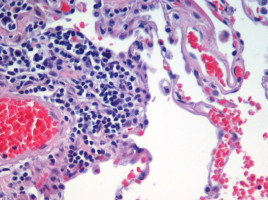
Ceritinib provides longer progression-free survival than chemotherapy in crizotinib-pre-treated patients with non-small-cell lung cancer harbouring an ALK rearrangement, according to results of the phase III ASCEND-5 study presented at the ESMO 2016 Congress in Copenhagen.
“Patients with non-small cell lung cancer (NSCLC) should receive front line therapy with the anaplastic lymphoma kinase (ALK) inhibitor crizotinib,” said lead author Professor Giorgio Scagliotti, head of the Department of Oncology, University of Turin, Italy.
“Most patients develop resistance to crizotinib and currently second line treatment is represented by chemotherapy alone.”
He continued: “This was the first phase III study to assess whether the second generation ALK inhibitor ceritinib was superior to chemotherapy upon progression on crizotinib therapy in NSCLC.”
The open-label ASCEND-5 study included 231 patients with NSCLC who had received crizotinib.
Patients were randomised 1:1 to receive therapy with ceritinib or chemotherapy (pemetrexed or docetaxel).
Patients who discontinued chemotherapy due to disease progression could crossover to ceritinib.
The primary endpoint was progression-free survival, assessed by a blinded independent review committee.
Median progression-free survival was significantly improved with ceritinib compared to chemotherapy (5.4 vs 1.6 months, hazard ratio [HR] 0.49, p<0.001).
Ceritinib increased overall response rate compared to chemotherapy (39.1% vs 6.9%).
There was no improvement in overall survival with ceritinib compared to chemotherapy.
Of the patients who discontinued chemotherapy due to disease progression, 75 crossed over to ceritinib.
Scagliotti said: “Progression-free survival was significantly lengthened with ceritinib compared to chemotherapy. We did not observe an improvement in overall survival with ceritinib, probably because the patients who crossed over diluted the potential benefit.”
Patients taking ceritinib had similar toxicities to those observed in phase I and II studies.
The most frequent grade 3/4 adverse events with ceritinib were nausea (7.8%), vomiting (7.8%) and diarrhoea (4.3%), and with chemotherapy were neutropaenia (15.5%), fatigue (4.4%) and nausea (1.8%).
Ceritinib significantly improved patient-reported outcomes including lung cancer-specific symptoms and overall health status, compared to placebo (p<0.05).
“This study opens up a new treatment paradigm after crizotinib failure,” said Scagliotti.
“It would be logical now to give a sequence of active drugs, starting with crizotinib in first line and moving to ceritinib in second line.”
Commenting on the trial, Dr Alice Shaw, director of thoracic oncology at the Massachusetts General Hospital Cancer Centre in Boston, US, said: “This is the first randomised study to examine how a second generation ALK inhibitor compares to standard second line chemotherapy in ALK positive patients who failed the standard first line therapy, which currently is crizotinib.”
“Single arm studies have suggested that ceritinib and alectinib could be standard options in the second line setting after crizotinib has failed,” continued Shaw.
“But the positive effect on progression-free survival in this phase III study confirms that there is greater benefit using a second ALK inhibitor over standard chemotherapy. This will establish sequential crizotinib followed by a second generation ALK inhibitor as the standard treatment for patients with metastatic ALK positive lung cancer.”
She concluded: “We are now waiting on the results of trials testing the second generation ALK inhibitors ceritinib (versus chemotherapy) and alectinib (versus crizotinib) in the first line setting. The latter trial addresses one of the most fundamental questions in the field, which is what should be the first ALK inhibitor that patients receive.”
We are an independent charity and are not backed by a large company or society. We raise every penny ourselves to improve the standards of cancer care through education. You can help us continue our work to address inequalities in cancer care by making a donation.
Any donation, however small, contributes directly towards the costs of creating and sharing free oncology education.
Together we can get better outcomes for patients by tackling global inequalities in access to the results of cancer research.
Thank you for your support.